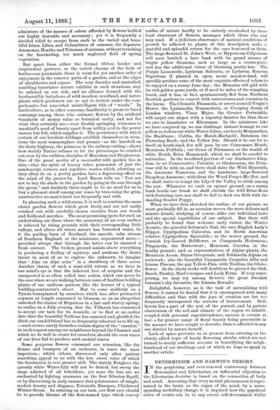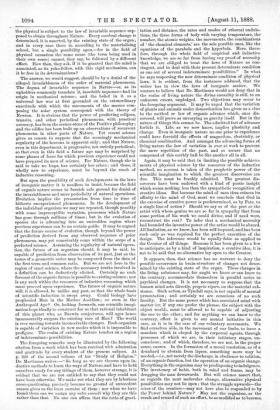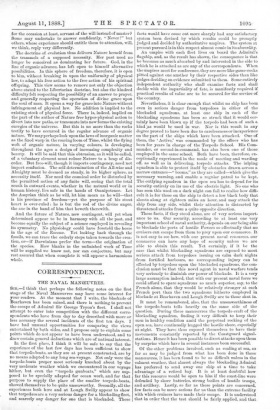DETERMINISM AND DARWIN'S THEORY.
IN the perplexing and ever-renewed controversy between Determinist and Libertarian, an influential objection to the Libertarian doctrine is based on the connection of body and mind. Assuming that every mental phenomenon is repre- sented in the brain, as the organ of the mind, by a corre- sponding medullary change, it is inquired how the psychical series of events can be to any extent self-determined, whilst
the physical is subject to the. law of invariable sequence sup- posed to obtain throughout Nature. Every cerebral change is determined, it is asserted, by the existing state of the organ ; and in every case there is, according to the materialising school, but a single possibility open,—for in the field of physical causation the same cause (the term being used in their own sense) cannot, they say, be followed by a different effect. How then, they ask, if it be granted that the mind is associated, as its yoke-fellow, with this rigid mechanism, can it be free in its determinations P
The answer, we would suggest, should be by a denial of the alleged invariableness of the order of material phenomena. The dogma of invariable sequence in Nature—or, as its upholders commonly translate it, inevitable sequence—had its origin in mechanical science ; and the belief in it as a universal law was at first grounded on the extraordinary exactitude with which the movements of the masses com- posing the solar system correspond with the theory of Newton. It is obvious that the power of predicting eclipses, transits, and other Periodical phenomena, with practical accuracy, has been the corner-stone of the Positive philosophy ; and the edifice has been built up on observations of recurrent phenomena in other parts of Nature. Yet recent science gives us reason to suppose that the seemingly mechanical regularity of the heavens is apparent only ; and that Nature, even in this department, is progressive, not strictly periodical; so that even in this field a future age may be surprised by some phases of force for which previous experience could not have prepared its men of science. For Nature, though she is said to take no leaps, has certainly her crises ; and these, if wholly new to experience, must be beyond the reach of inductive reasoning.
But upon the possibility of such developments in the laws of inorganic matter it is needless to insist, because the field of organic nature seems to furnish safe ground for denial of the invariableness and mere periodicity of natural operations. Evolution implies the presentation from time to time of hitherto unexperienced phenomena. In the development of the individual organism we may see repeated, though possibly with some imperceptible variation, processes which Nature has gone through millions of times ; but in the evolution of species she is advancing into an nntrodden region where previous experience can be no certain guide. It may be argued that the future course of evolution, though beyond the power of prediction derived from any observed sequence of prior phenomena, may yet conceivably come within the scope of a perfected science. Assuming the regularity of natural opera- tion, the future of an organism should, it may be said, be capable of prediction from observation of its past, just as the terms of a geometric series may be computed from the data of the first term and common ratio. But we are not here in the region of exact science, where the necessary truths involved in a definition can be deductively elicited. Certainly no such forecast of the organic future is possible to existing science ; nor is any such within the resources of inductive reasoning, which must proceed upon experience. The future of organic nature -will, it is allowed, be unlike any past, so that the whole basis of scientific induction is swept away. Could biology have prophesied Man in the Marine Ascidian ; or even in the Anthropoid Ape? Or, looking forwards, can scientific imagi- nation hope ideally to construct for us that rational inhabitant of this planet who, as Darwin conjectures, will ages hence immeasurably surpass the existing race of Man ? The world is ever moving towards inconceivable changes. Each organism is capable of variation in new modes which it is impossible to prefigure. The realm of existing Nature touches on a region of indeterminate possibilities.
The foregoing.remarks may be illustrated by the following citation from a work which has been received with admiration and gratitude by every student of the present subject. At p. 248 of the second volume of his " Study of Religion," Dr. Martineau writes :—" So -long as we are thrown upon in- ductive methods to learn the ways of Nature, and have to hold ourselves ready for any tidings of them, however strange, it is evident that we are not entitled to say that they could not have been otherwise. We make out what they are by laborious cross-questioning, precisely because no ground of antecedent reason gives us the least surmise of them : nor when we have found them can we assign any ratio essencli why they are this rather than that. No one can affirm that the ratio of gravi- tation and distance, the rates and modes of ethereal undula- tions, the three forms of body with varying temperature, the number, the atomic weights, the movements, the combinations of the chemical elements,' are the sole possible ones, like the equations of the parabola and the hyperbola. Here, there- fore, through the whole field of empirical and inductive knowledge, we are so far from having any proof of necessity that we are obliged to treat the laws of Nature as con- tingent, and to deal with their present determinate condition as one out of several indeterminate possibilities." In what he says respecting the now determinate condition of physical laws, it is evident, from the instances adduced, that the writer has in view the laws of inorganic matter. We venture to believe that Dr. Martineau would not deny that in the realm of living nature the divine causality is still, to an unknown extent, nnpledged. Two objections may occur to the foregoing argument. It may be urged that the variation -of plants and animals under domestication has given us a clue to the method or law of organic advance which, once dis- covered, will prove as unvarying as gravity itself. But in the nature of things this cannot be. The admitted fact of advance forbids it. Life, as we now know, implies plasticity and change. Even in inorganic nature no one prior to experience could have foretold the effects of magnetism, electricity, or chemical combination. And amongst the advancing forms of living nature the law of variation is ever at work to prevent the mere repetition of the past, and so secure that no compound of this earthly ball be like another all in all.
Again, it may be said that in limiting the possible achieve- ments of physical science by the resources of the inductive method, no account is taken of the prophetic power of the scientific imagination to which the greatest discoveries are due. This must be frankly admitted. The greatest dis- coverers have been endowed with a kind of poetic insight which seems nothing less than the sympathetic recognition of creative ideas. But because the mind of man thus evinces its affinity to the mind of God, must we conclude that God in the exercise of creative power is predetermined, as by Fate, to a single line of action Should we say so of the poet or the artist with whose genius we are so far in sympathy that from some portion of his work we could divine, and if need were reconstruct the rest ? To infer that a mechanical necessity had bounded the inventive power of the artist would be absurd.. All limitation, as we know, has been self-imposed, and has been such only as was required for the perfect execution of the design. The inference would be equally false as applied to the Creator of all things. Because it has been given to a few to anticipate, as by a kind of inspiration, a creative idea, it is not to be said that no alternative Jay open to the Creator.
It appears, then, that science has no warrant to deny the possible occurrence in brain-structure of changes not deter- mined by the existing state of the organ. These changes in the living substance may, for aught we know or can know to the contrary, accommodate themselves in parallel series to psychical changes. It is not necessary- to suppose that the human mind acts directly, proprio vigore, on the material sub- stance. Such action, as Tyndall says, is not capable of mental presentation ; and certainly we are conscious of no such faculty. But the same power which has associated mind with matter (or, if any one prefer the phrase, the subject with the object world), must be allowed to be capable of adjusting the one to the other; and for anything we can know to the contrary, effect is given to our mental initiative in this case, as it is in the case of our voluntary movements. We find ourselves able, in the movement of our limbs, to issue a mandate which is obeyed by the corporeal agents, through processes of which we are, in their initiatory stages, un- conscious; and of which, therefore, we 'are not, in the proper sense, causes. In the formation of a moral resolution, as of a drunkard to abstain from liquor, something more may be needed,—i.e., not merely the discharge, in obedience to volition, of an organic function, but the operation of an organic change. Everything in the organism may be predisposing to indulgence. The inveteracy of habit, both in mind and frame, may be dragging the man downwards. But will science assert that, as regards the next molecular change, alternative physical possibilities may not lie open ; that the struggle upwards—the nisus of the creature—may not here also be responded to by the Power behind Nature ? May not the organism, as the result and reward of such an effort, be so modified as to become,
for the occasion at least, servant of the will instead of master ? Some may undertake to answer confidently, " Never !" but others, whose experience should entitle them to attention, will, we think, reply very differently.
The doctrine of evolution thus delivers Nature herself from the trammels of a supposed necessity. Her past need no longer be conceived as dominating her future. God, in the line of organic advance, has left open to himself alternative possibilities. In this sphere of freedom, therefore, it is open to him, without breaking in upon the uniformity of physical law, to adapt his free action to the free action of his spiritual offspring. This view seems to remove not only the objection above stated to the Libertarian doctrine, but also the kindred difficulty felt respecting the possibility of an answer to prayer, and generally respecting the operation of divine grace upon the soul of man. It opens a way for grace into Nature without infringement of physical law. No addition is implied to the existing stock of physical force. There is, indeed, implied on the part of the author of Nature free hyper-physical action to divert into new paths, or transmute into new forms the existing energies of the universe. But this is no more than the rocks testify to have occurred in the regular advance of organic nature. We may perhaps look uponthe laws of inorganic matter as the fixed warp in the roaring loom of Time, whilst the flying weft of organic nature, in varying colours, is developing throughout the ages a design of increasing complexity and beauty. It will be said that this obtrusion, as it will be called, of a voluntary element must reduce Nature to a heap of dis- order. But free-will, though it imports contingency, need not import confusion. The self-determination of the All-wise and Almighty must be deemed as steady, in its higher sphere, as necessity itself. Nor need the cosmical order be disturbed by the permitted action of any finite will, seeing that the total result in outward events, whether in the natural world or in human history, lies safe in the hands of Omnipotence. Let the Assyrian think as he will, let him mean as he will—that is his province of freedom—yet the purpose of his stout heart is over-ruled : he is but the rod of the divine anger, the axe in the hand of him that heweth therewith.
And the future of Nature, now contingent, will yet when determined appear to be in harmony with all the past, and become equally the subject of a science employed in revealing its symmetry. No physiology could have foretold the horse in the age of the Eocene. Yet looking back through the fossils, we can trace the orderly steps taken towards the crea- tion, or—if Darwinians prefer the term—the origination of the species. How blanks in the unfinished work of Time will be supplied we know not, nor can conjecture, but may rest assured that when complete it will appear a harmonious -whole.




































 Previous page
Previous page